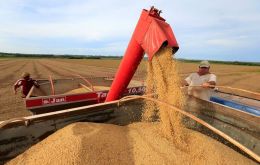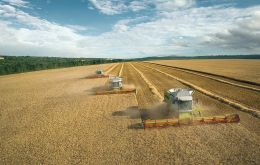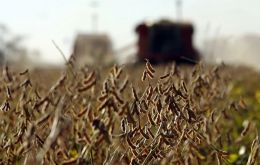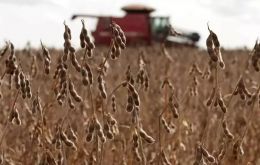MercoPress. South Atlantic News Agency
Tag: soybean
-
Monday, October 13th 2025 - 07:48 UTC
Trump’s trade war has cemented Brazil’s place as the soybean superpower, says The Economist

They say no one wins a trade war. Certainly, there are fewer bigger losers than soybean farmers in the United States. Since May China, by far their biggest customer, has refused to buy a single bushel in retaliation for Donald Trump’s tariffs. The spat is ruining farmers in Illinois; Mr Trump is set to announce a US$10bn agricultural-relief package. It is also raising costs for crushers in China’s Shandong province, who press beans into animal feed and cooking oil. But there has been one big winner: soybean producers in Brazil. The rift between American farmers and their Chinese clients has let Brazil cement its place as the world’s soybean superpower.
-
Wednesday, October 1st 2025 - 08:32 UTC
Argentina's temporarily dropping export duties shakes CBOT

The government of Argentina temporarily implemented a zero export duty quota on grain shipments (up to a US$7 billion ceiling), which was exhausted by exporters in just three days.
-
Thursday, May 29th 2025 - 10:15 UTC
Uruguay clinches rapeseed and soybean meal deal with China

Uruguay and China signed a historic agreement enabling the South American country to export rapeseed and soybean meal. The phytosanitary protocol ensures safety, inspection, and traceability standards for these high-protein products, which are much in demand for animal feed in Asia.
-
Wednesday, May 21st 2025 - 08:05 UTC
Brazil’s command of soy markets tested by record crops and Argentina

Despite a record grains and oil seeds harvest, Brazil’s soybean trading has slowed significantly, because of the mismatch between buyers’ prices and suppliers’ expectations, points out Globo Rural, an agribusiness site.
-
Monday, April 22nd 2024 - 12:28 UTC
Downward revision reported for Argentine 2024 agricultural exports

Argentina's 2024 exports of soybean, corn, wheat, sunflower, and barley have been projected to reach barely US$ 29.3 billion, which would represent a US$ 5.7 billion recovery from 2023 but a US$ 1.7 billion slump compared to the last five years' average, the Grain Stock Exchange in Rosario (BCR) announced in its latest Guía Estratégica para el Agro (GEA) report. The new figures represent an 18% downward revision from December's calculations.
-
Tuesday, August 29th 2023 - 06:34 UTC
Brazil manages record soybean exports, at lower prices, but much will now depend on the US crop

Despite the slow pace of soybean trade in the past five years, the first seven months of 2023 have seen Brazil achieve a record volume of exports, reaching over 70 million tons, as reported by the country’s National Supply Company (Conab) last week.
-
Thursday, June 29th 2023 - 08:19 UTC
Brazil declares a record harvest of soy beans, 156 million tons in 2023

The Brazilian Association of Vegetable Oil Industries (Abiove) reported that the soybean harvest in Brazil, already completed in 2023, exceeded expectations, leading to an upward revision in export forecasts for soybean grain, meal, and oil this year. Soy remains Brazil’s primary export product.
-
Monday, April 10th 2023 - 12:54 UTC
More dramatic estimates from Argentine agriculture and soy crop

The Safras & Mercado consultancy revised Argentina's soybeans production estimate for 2022/2023 of some 24.8 million tons, dramatically down from the previous forecast in March of 31.4 million tons.
-
Wednesday, March 29th 2023 - 10:46 UTC
Boom year for Brazilian farmers with record soybean crop and drought punishing Argentine production

Brazil’s soybean output and exports in 2023 will be higher than expected, Brazilian oilseed lobby Abiove announced this week, as local farmers harvest a bumper crop. Abiove now estimates Brazil’s soy production at a record 153.6 million tons, one million more than the last projection last January.
-
Tuesday, March 28th 2023 - 11:11 UTC
Argentina becoming net importer of soybean to feed its grain processing industry

Argentina’s soybean imports are expected to more than double this season due to the devastating impacts of the historic drought on the country’s 2022/23 harvest, the country’s Rosario grains exchange said in a report.
